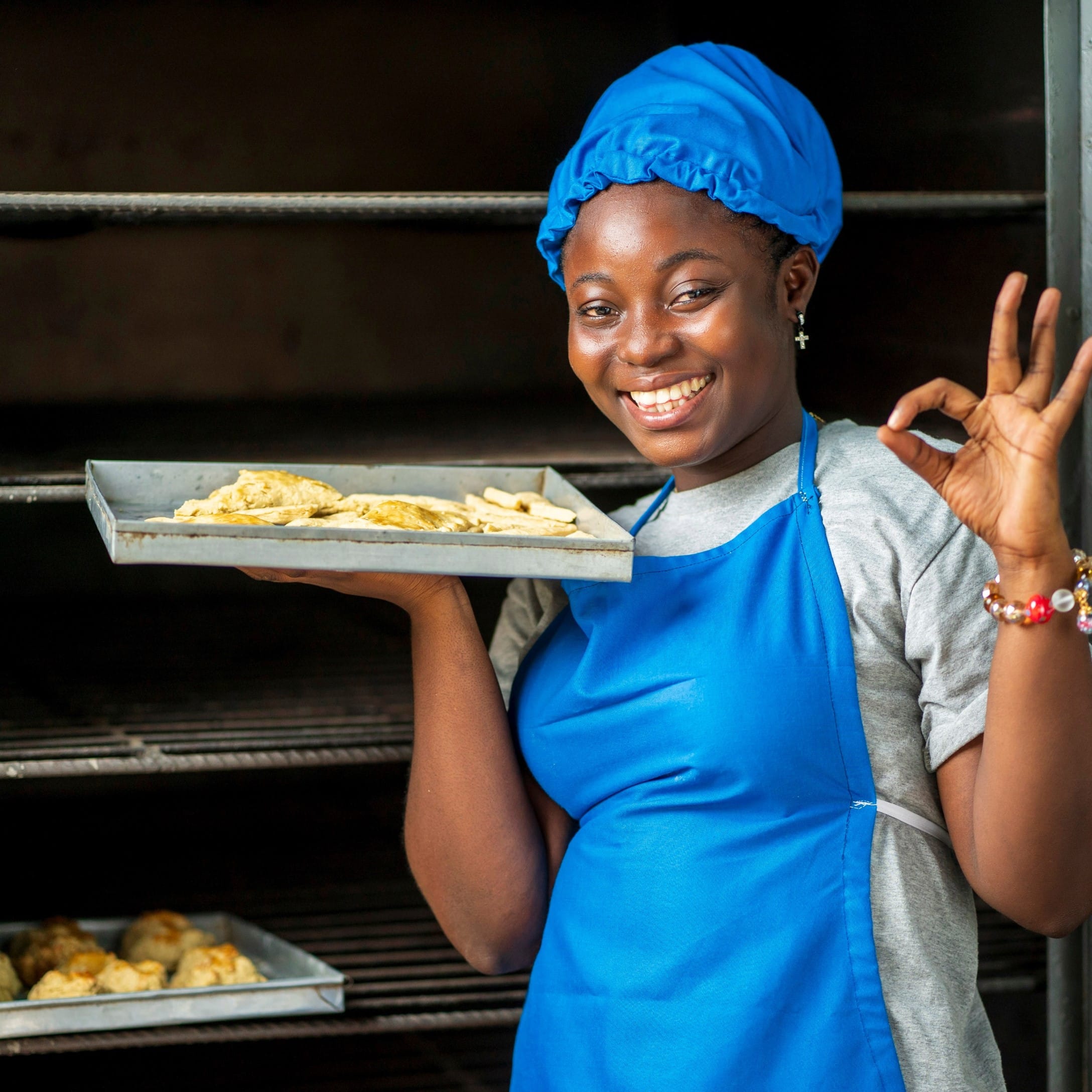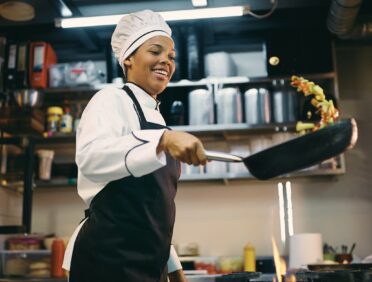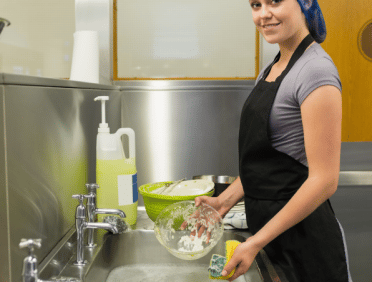What is Catering?
Catering is the preparation and serving of food and beverages to a group of people, usually at an off-site location or event. Catering companies are in charge of planning, cooking, presenting, and serving food at various events such as weddings, corporate meetings, parties, and conferences.
Key points of distinction between catering and hospitality
Catering and hospitality are important parts of the service industry, and professionals in these fields strive to provide exceptional experiences for their clients or guests, whether at an event or in a business.
Catering and hospitality are two industries that provide food, beverages, and services to individuals and groups in a variety of settings. While they are related, their roles and functions within the broader service and hospitality sectors are distinct.
Focus
Catering is primarily concerned with providing food and beverages for events, whereas hospitality includes a broader range of services and experiences.
Location
Catering is frequently provided off-site, at the event’s location, whereas hospitality services are typically provided at established establishments such as hotels, restaurants, and resorts.
Scope of Services
Catering services include the preparation, delivery, and service of food and beverages. Hospitality services go beyond food and drink to include lodging, entertainment, and the overall guest experience.
Customer Base
Catering customers are typically event hosts or organisers. In contrast, hospitality is concerned with individual guests or customers who visit a business.
Catering Services
Catering services range from simple drop-off or pick-up orders to full-service catering, which includes everything from menu planning and food preparation to serving and cleanup.
When deciding which caterer will cater for their event, there are several factors that can influence the client’s choice of catering services. These factors include the nature of the event, the client’s financial concerns, and the client’s desired level of participation. Drop-off and pick-up catering options are better suited for smaller or less formal gatherings, providing a more hands-on and budget-friendly approach.
Drop-off or Delivery Catering
In this option, the catering company prepares the food, packages it, and delivers it to the event location. Clients are in charge of preparing the food, serving it, and cleaning up after the event.
It is an ideal choice for casual gatherings, office meetings, or smaller events that require little service.
Pick-up Catering
Similar to drop-off catering, but the client must pick up the food from the catering company’s location. This option is ideal for clients who would rather handle their own transportation but still want professionally prepared food.
Buffet Catering
Buffet catering entails establishing a self-service station with a variety of dishes. Guests can choose their favourite items and serve themselves. Caterers are in charge of preparing the food, providing serving utensils, and keeping the buffet area clean.
Food Stations
At an event, food stations are interactive and themed culinary setups. Guests can move from station to station, selecting various cuisines or dishes. This option enhances the entertainment and customization of events.
Family-Style Catering
Platters of food are placed on each table in family-style catering, and guests pass the dishes around and serve themselves. It promotes communal dining and is popular for weddings and family gatherings.
Full-Service Catering
Full-service catering offers a complete catering experience in which the caterer manages all aspects of the event. Menu planning, food preparation, setup, serving, and cleanup are all included. Staff members are frequently on hand to serve guests, attend to their needs, and ensure that the event runs smoothly.
Bar Services
Some catering companies provide bar services, such as setting up a bar area and providing bartenders and a selection of beverages. This is common at alcoholic beverage-serving events such as weddings and corporate parties.
Customised Menu Planning
Caterers collaborate with clients to develop custom menus that reflect their tastes, dietary restrictions, and event theme. This service provides clients with a one-of-a-kind culinary experience tailored to their specific needs.
Event Planning and Coordination
Some businesses provide event planning and coordination services in addition to catering. They assist clients in venue selection, décor, entertainment, and other aspects of event planning to ensure a smooth and memorable event.
Types of Catering
Catering services can vary greatly depending on the type of event or occasion served. Here are a few examples of common types of catering, each with its own set of specialties and requirements.
These are just a few examples of catering types; depending on the event and the client’s needs, there are many more specialised niches within the catering industry. Catering companies frequently tailor their services to the specific needs of each event they serve.
Corporate Catering
Purpose: Meetings, conferences, seminars, product launches, and corporate parties can all benefit from corporate catering.
Specialties: The emphasis is frequently on professional presentation and a diverse menu that accommodates a wide range of tastes and dietary restrictions.
Requirements: It is critical to be on time, reliable, and able to accommodate large groups. Breakfast buffets, boxed lunches, and formal dinners are all possible menu options.
Wedding Catering
Purpose: Wedding catering is intended for wedding receptions as well as related events such as rehearsal dinners and bridal showers.
Specialties: Wedding caterers frequently create personalised menus based on the couple’s preferences and theme. Presentation and service are critical, and guests may have special dietary needs.
Requirements: Detail-orientedness, adaptability, and the ability to work within the wedding’s timeline and venue constraints are essential.
Social Event Catering
Purpose: Birthday parties, anniversary celebrations, family reunions, and holiday gatherings are all examples of social event catering.
Specialties: Menus can vary greatly depending on the occasion. It is critical to be able to accommodate different themes and preferences.
Requirements: Understanding the host’s vision and the preferences of the guests is critical. Cultural or regional cuisine preferences may exist at social events.
Restaurant Catering
Purpose: Restaurants frequently extend their catering services to provide menu selections for events held outside of their premises, such as corporate meetings, parties, and other gatherings.
Specialties: Typically, the restaurant’s signature dishes are featured, and the quality and taste should be consistent with the restaurant experience.
Requirements: Coordination between the restaurant’s kitchen and catering team is essential, as is reliable food transportation.
Buffet Catering
Purpose: Buffet catering stands out for its self-service arrangement, which allows guests to select from a wide variety of dishes.
Specialties: A diverse menu is available, allowing guests to personalise their meals. Buffet catering is popular due to its versatility and low cost.
Requirements: Food safety requires efficient setup and replenishment of food, as well as proper temperature maintenance.
Drop-off Catering
Purpose: Drop-off catering entails bringing pre-prepared food to an event location without providing on-site service.
Specialties: Menu items are usually simple to transport and serve. This is a popular choice for casual events and small gatherings.
Requirements: Proper packaging and clear serving and presentation instructions are essential.
Gourmet Catering
Purpose: Gourmet catering caters to high-end, upscale events where culinary creativity and presentation are of the utmost importance.
Specialties: Dishes that are innovative and artisanal are created to impress discerning diners. It is possible that wine pairing and intricate plating will be involved.
Requirements: Gourmet dining experiences necessitate highly skilled chefs and meticulous attention to detail.
Key Takeaways About The Catering Sector
These takeaways provide a snapshot of the UK catering sector, emphasising its diversity, customer-centric approach, and importance of quality and adaptability.
Diverse Industry
The catering industry in the United Kingdom is diverse and dynamic, offering a wide range of services and opportunities.
Event Specialisation
Caterers frequently specialise in various types of events, such as weddings, corporate functions, and social gatherings, tailoring their services to the specific requirements of each.
Menu Variety
Offering a diverse and customizable menu to cater to different tastes and dietary requirements is an important aspect of successful catering.
Full-Service Options
Full-service Caterers can handle everything from menu planning and food preparation to on-site service and cleanup.
Drop-off and Pick-up
Drop-off and pick-up catering options are available for more casual events, making it easier for clients who prefer a DIY approach.
Quality and Presentation
In the catering industry, food quality and presentation are critical factors, and caterers strive to create visually appealing and delicious dishes.
Corporate Clients
Many caterers provide catering for corporate clients, such as meetings, conferences, and corporate events, where professionalism and efficiency are essential.
Wedding Specialisation
Wedding catering is a significant segment that necessitates meticulous attention to detail, customization, and the ability to execute flawless receptions.
Social Event Focus
Catering for social events ranges from family reunions to birthday parties, necessitating flexibility in menu planning and service.
Adaptability
To thrive in this ever-changing industry, successful caterers must be adaptable, staying current with food trends, sustainability practises, and customer preferences.
Catering Online Training
If you own or work in a food business and haven’t already got a certificate, one way to start training yourself and your colleagues is to take a Food Hygiene course.
- Level 2 Food Safety Training: is an introductory course that covers basic food safety principles and practices. This qualification is designed for anyone who works with food, including front-line staff and supervisors. The course typically covers topics such as food hygiene, food contamination, food storage and preservation, and personal hygiene.
- Level 3 Food Safety Training: is an advanced course that provides a more detailed understanding of food safety principles and practices. This qualification is designed for managers and supervisors who have responsibility for food safety in their workplace. The course typically covers topics such as food safety legislation, HACCP principles, risk assessment, and management of food safety hazards.
Level 2 training is more basic and suitable for front-line staff, while Level 3 training is more advanced and suitable for managers and supervisors with greater responsibility for food safety in their workplace.
All of our courses have discounts for 10+ orders
Or SAVE OVER 50% and ensure your business is even safer by choosing one of our bundles:













